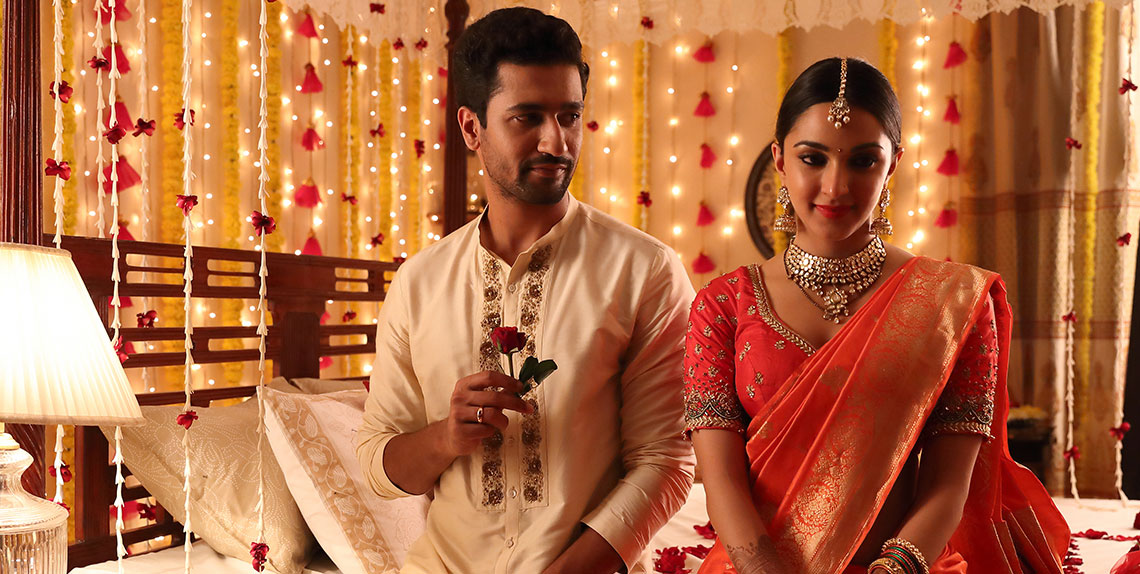The liberalisation of the Indian film industry, brought about partly by overseas investment and the leisure and pleasures that follow from money, continues at considerable speed. Earlier this year, Veere Di Wedding proposed that its heroines might go beyond a kiss in a rainstorm, and actively enjoy themselves in a bedroom context; its release was preceded by the Netflix-backed portmanteau project Lust Stories, in which four of the industry's leading filmmakers, freed from the strictures of domestic censorship, offer up a thirty-minute quickie on what it is to desire, and to act on that desire, in a hot climate. The results display one limitation, namely a certain tentativeness around the depiction of the sex act itself: years of finger-wagging conservatism can't be thrown off so easily, which results in a light sprinkling of lingering fadeouts and some ultra-carefully framed and lit couplings. Yet the whole is well written, directed and performed - a consistently satisfying foursome, no matter that it more often than not frames physical intimacy as the most loaded of minefields.
Right from Anurag Kashyap's first entry, in fact, occasion for a tour de force from Radhika Apte as a thirsty college lecturer tying herself in knots after drunkenly seducing one of her students (Akash Thosar, the lad from Sairat). It's less a short story than a rolling character study: subsequent events are intercut with a distinctly Godardian interview that positions the lecturer as the modern Indian woman, struggling to come to terms with her powers in an era that has generated as much confusion as consummation. Apte knocks the punchline out of the park, and - like so many Kashyap projects, up to and including his new Netflix series Sacred Games - it has a terrific eye for locations (comic-book shops, comedy clubs) rarely visited in mainstream Indian cinema. Zoya Akhtar's second part begins mid-fuck, before developing into a textured and very poignant study in post-coital sadness - the sadness of a housemaid discarded by her employer in favour of a more socially desirable bride. An excellent Bhumi Pednekar barely speaks a word, but conveys huge amounts through pauses and gesture; the emotion is further amplified by the rapt attention Akhtar pays to domestic spaces, and the way her characters move through them.
The third short - overseen by Dibakar Banerjee, the least familiar of these directors - benefits from the most immediately compelling situation. A desperate businessman calls his best friend to air his fears that his wife may have another lover; the early twist, as you may already have guessed, is that the pal knows all too well about the infidelity, what with the woman in question being at his side (and underneath him in flashbacks). There follows a negotiation - first via fraught, expertly performed end-of-tether phone calls, then more cordially face-to-face - in which old pals attempt to talk their way out of the mess their bodies have made while keeping their existing relationships intact. It's the most self-consciously "adult" of the four contributions - you can feel the influence of TV's The Affair upon its look and narrative - and the editorial occasionally bobs a little too close to its glassy surface, especially when the husband comes into view: vulgar new money who states a preference for action movies over subtler fare (like, presumably, Lust Stories) and whose black-and-white worldview is such he believes that if his wife doesn't love him, she must hate him. The talk redirects everybody to a more interesting place: an understanding that the truth of most relationships lies somewhere in between the two poles.
That sober lesson is balanced by the fourth and final instalment, wherein that notable showman Karan Johar offers up a contemporary comedy of errors centred on a pair of nervy newlyweds (Vicky Kaushal and Kiara Advani) struggling to get over the husband's inexperience in the boudoir. There's much to like here: Advani's increasingly underwhelmed and exasperated expressions, a very good play on the opening line of Nabokov's Lolita, and another gag, premised on the misapplication of a sex toy, which pays off (one hesitates to say climaxes) in quite the most shameless fashion imaginable. (Doubly so, if you spot the reference to Johar's own Kabhi Khushi Kabhie Gham....) Running through it all, something actively progressive: a case for sex as a means of recreation, rather than the procreation one's elders might insist upon. Netflix's own parenting - that hands-off approach that has indulged creatives with all the time, space and money they might demand - has proven disastrous for Western filmmakers in the main, as the platform's slew of understreamed, you-couldn't-give-it-away content has made abundantly clear. Yet it seems to be working rather better for Indian filmmakers, less inclined, perhaps, to take such freedoms for granted. The two parties have a good thing going here: long may it continue.
Lust Stories is now streaming on Netflix.

No comments:
Post a Comment